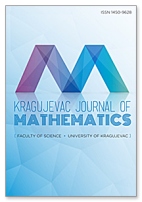On the Existence and Uniqueness of Fuzzy Mild Solution of Fractional Evolution Equations
 Download PDF
Download PDF
Authors: A. EL GHAZOUANI, F. I. A. AMIR, M. ELOMARI AND S. MELLIANI
DOI: 10.46793/KgJMat2506.949G
Abstract:
In this paper, the nonlocal Cauchy problem is discussed for the fuzzy fractional evolution equations in an arbitrary Banach space for order q ∈ (1, 2) and the criteria on the existence and uniqueness of mild fuzzy solutions are obtained by using Schauder’s fixed point theorem. An example to illustrate the applications of main results is also given.
Keywords:
Fuzzy fractional evolution equations, mild fuzzy solutions, Banach space, Schauder fixed point theorem.
References:
[1] G. A. Anastassiou, Fuzzy Mathematics: Approximation Theory, Studies in Fuzziness and Soft Computing, Springer, Berlin Heidelberg, 2010. https://doi.org/10.1007/978-3-642-11220-1
[2] B. Bede and S. G. Gal, Generalizations of the differentiability of fuzzy-number-valued functions with applications to fuzzy differential equations, Fuzzy Sets and Systems 151(3) (2005), 581–599. https://doi.org/10.1016/j.fss.2004.08.001
[3] B. Bede, Fuzzy sets, in: Mathematics of Fuzzy Sets and Fuzzy Logic, Springer, Berlin, Heidelberg, 2013, 1–12. https://doi.org/10.1007/978-3-642-35221-8_1
[4] B. Bede and L. Stefanini, Generalized differentiability of fuzzy valued functions, Fuzzy Sets and Sysstems 230(0) (2013), 119–141. https://doi.org/10.1016/j.fss.2012.10.003
[5] T. Allahviranloo, Z. Gouyandeh, A. Armand and A. Hasanoglu, On fuzzy solutions for heat equation based on generalized Hukuhara differentiability, Fuzzy Sets and Systems 265 (2015), 1–23. https://doi.org/10.1016/j.fss.2014.11.009
[6] T. Allahviranloo, Fuzzy fractional differential operators and equations, Studies in Fuzziness and Soft Computing 397 (2021). https://doi.org/10.1007/978-3-030-51272-9
[7] H. C. Wu, The improper fuzzy Riemann integral and its numerical integration, Inf. Sci. 111(14) (1998), 109–137. https://doi.org/10.1016/S0020-0255(98)00016-4
[8] H. Brezis, Functional Analysis, Sobolev Spaces and Partial Differential Equations, Springer, 2010. https://doi.org/10.1007/978-0-387-70914-7
[9] A. Armand and Z. Gouyandeh, Fuzzy fractional integro-differential equations under generalized Caputo differentiability, Annals of Fuzzy Mathematics and Informatics 10(5) (2015), 789–798.
[10] T. Allahviranloo and M. B. Ahmadi, Fuzzy Laplace transforms, Soft Computing 14(3) (2010), 235–243. https://doi.org/10.1007/s00500-008-0397-6
[11] O. Kaleva, Fuzzy differential equations, Fuzzy Sets and Systems 24(3) (1987), 301–317. https://doi.org/10.1016/0165-0114(87)90029-7
[12] M. L. Puri, D. A. Ralescu and L. Zadeh, Fuzzy random variables, in: Readings in Fuzzy Sets for Intelligent Systems, Morgan Kaufmann, 1993, 265–271. https://doi.org/10.1016/B978-1-4832-1450-4.50029-8
[13] B. Dubey and R. K. George, Controllability of linear time-invariant dynamical systems with fuzzy initial condition, Proceedings of the World Congress on Engineering and Computer Science (2) (2013).
[14] N. T. K. Son, A foundation on semigroups of operators defined on the set of triangular fuzzy numbers and its application to fuzzy fractional evolution equations, Fuzzy Sets and Systems 347 (2018), 1–28. https://doi.org/10.1016/j.fss.2018.02.003
[15] R. Gorenflo, A. A. Kilbas, F. Mainardi and S. V. Rogosin, Mittag-Leffler Functions, Springer, New York, 2014. https://doi.org/10.1007/978-3-662-43930-2
[16] N. Iqbal, A. U. K. Niazi, R. Shafqat and S. Zaland, Existence and uniqueness of mild solution for fractional-order controlled fuzzy evolution equation, Journal of Function Spaces 2021 (2021), 1–8. https://doi.org/10.1155/2021/5795065
[17] A. U. K. Niazi, J. He, R. Shafqat and B. Ahmed, Existence, uniqueness, and Eq-Ulam-type stability of fuzzy fractional differential equation, Fractal and Fractional 5(3) (2021), paper ID 66. https://doi.org/10.3390/fractalfract5030066
